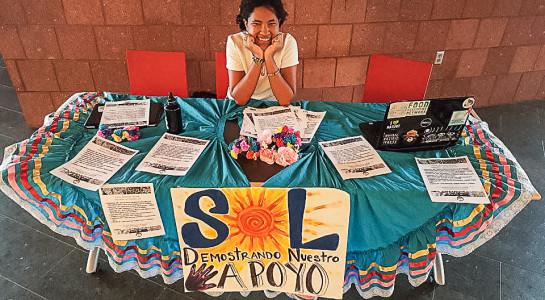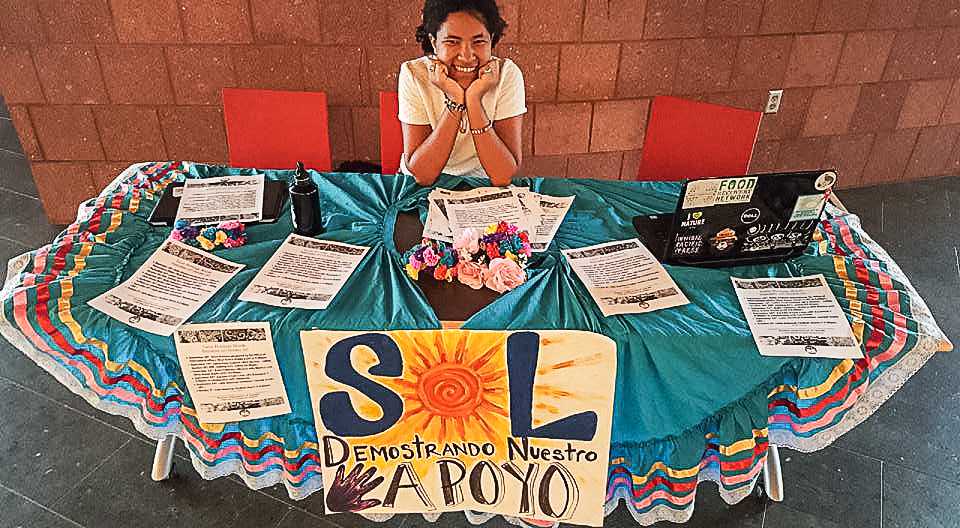Tuesday, Sept. 15, kicked off the start of National Hispanic Heritage Month, a nationwide celebration to recognize the heritage and history of Latin American cultures.
At Grinnell College, the student group Student Organization of Latinos and Latinas (SOL) is holding Latin Heritage Month to show different aspects of Latin culture and provide a space for Latin students at Grinnell to connect.
One of the events was a cookout that was held last Sunday, Sept. 20.
“We had a whole bunch of food – tostones (which are fried bananas), empanadas, quesadillas, guacamole and pico de gallo,” said Armando Perez ’17, one of the co-leaders of SOL. “It’s nice making the food and eating it, hanging out with friends and just getting the vibe.”
Some students did consciously celebrate heritage month before coming to Grinnell.
“Most of my memories come from the [dance] group that I was part of because we would have a lot of performances,” said Mónica Loza ’18, a member on the SOL board who performs Mexican folk dance. “I’m from Los Angeles and there would be a lot of requests for us to perform, so that was our busiest month.”
Loza fondly remembers her experiences dancing before attending Grinnell. “I always liked it because it’s a nice way for all the Latinos to come together,” she recollected. “Even though we’re all different because we come from different countries, being Latino unifies us.”

While the events held at the College showcase Latin culture, they may not bring light to the students’ personal identities and the more delicate issues of being Latin.
For instance, something that is not always acknowledged, particularly among people who are not of Latin heritage, is how many different cultures fit under the general umbrella of Latino.
Even the term “Latino” is mostly an American construction. While many students are fine with using the term, they may not identify with it or have any strong feelings towards it.
This applies especially with international students.
“In my country we’re all Latinos and being Latin is the equivalent of being Caucasian here, so it was never a big thing,” said Alejandra Rodriguez ’17. “People are like, ‘You’re Latin,’ and I’m like, ‘Yeah.’”
Other students embrace the term more enthusiastically.
“It’s beautiful knowing you’re Latino because when you connect with somebody who identifies as Latino and doesn’t identify within your ethnic group, which is a specific one such as Salvadorian or Mexican, you have that connection because you feel Latino,” said Yesenia Ayala ’18. “You feel you share similar experiences in the United States and that’s what makes us really connect with one another.”
Even with some shared aspects, there is no singular Latino experience and different families approach that in their own way.
Channel Turbides ’17 recounted the emphasis her family placed on keeping cultural ties with the Dominican Republic, her home country.
“My family worked hard so that I could go every summer [to the Dominican Republic] and spend time with my family,” she said. “It’s a great sacrifice for a single mother to be able to do that.”
Some students felt that there was a crucial political aspect to their Latin identity. For instance, the experience Karolina Gil-Marquez ’17 had growing up gave her insight into how politics can impact some groups of Latino people.
“My mom moved from Colombia to the U.S. as a political refugee and then she had me, but here she had a problem, [so we] had to move back to Colombia,” she recollected. “We stayed [there] for most of my childhood. Then we [were] political refugees again so we had to move back while my brother stayed in Colombia.”
This experience has caused Gil-Marquez to understand the significance of immigration issues.
“I sympathize a lot with political refugees in countries because … this whole thing with immigration split our family,” she said. “I know that happens to a lot of Latinos in the States and you don’t get to see your family for a long time.”
Some students talked about how Grinnell College can be an uncomfortable place for a student with Latin American heritage to be in, despite how much they talk about diversity.
While Latino students in Grinnell are not often targeted with slurs or other direct discrimination, it still can happen. “It just gets me angry that the color of my skin makes assumptions to people of how certain groups are portrayed,” Ayala said. “I haven’t necessarily experienced it here in the school but I experienced it in town. I had people say racial slur words as they were driving by.”
Slurs yelled from a car may be one of the most overt forms of discrimination, but there are more subtle forms lingering on campus and in the classroom.
“If you look around in the class, it’s like five of us who are people of color, either African-American, Latino or Muslim, or something like that,” Gil-Marquez said. “It’s all five of us in one corner and the rest is all White students.”


































































